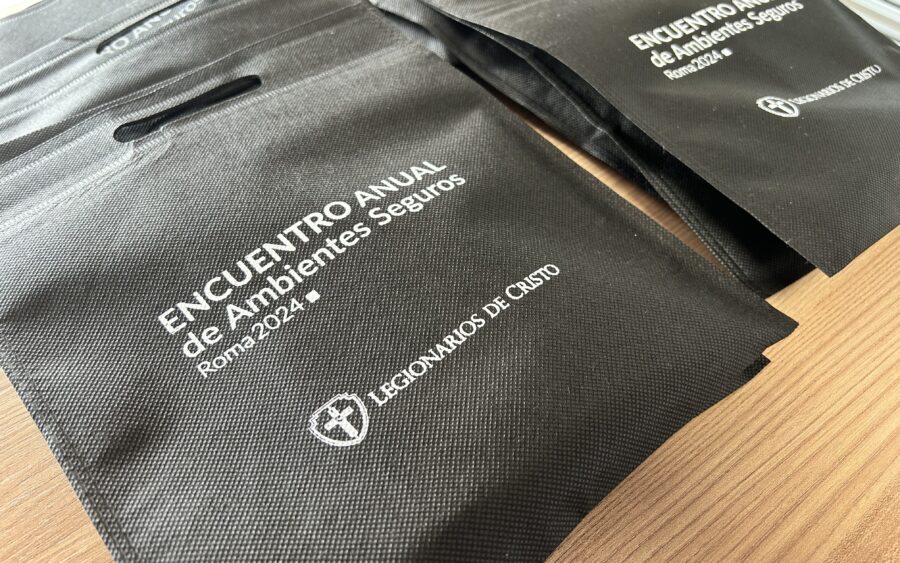Over 27 attendees, including territorial coordinators and teams of safe environments of the Legionaries of Christ, participated in this gathering where the commitment to make the Legion and the Church a place of welcome, protection, and care was reaffirmed.
Reaffirming the commitment to continue the path for the promotion and strengthening of safe environments in each of the Legionary activities, from September 23 to 27, at the general headquarters of the Legionaries of Christ in Rome, the VII Annual Safe Environments Meeting was held, a space in which more than 27 attendees, including territorial coordinators and safe environment teams, participated where the commitment to making the Legion and the Church a place of welcome, protection, and care was reaffirmed. This seventh edition continues the projects initiated in the meetings of 2017 (Spain), 2019 (Mexico City), 2020 (virtual due to the pandemic), 2021 (Mexico City), 2022 (Rome), and 2023 (Monterrey, Mexico).
Catalina Gallego Barbier, international director of Safe Environments of the Legion, stated in her opening message that “the meeting is a call to action and hope, where each person has a crucial role in building a more conscious culture of safe environments.” She also thanked the presence and contribution of each coordinator and participant, highlighting that “dignity and respect are the unbreakable norm”.
The week of joint work aimed to address different areas that influence safe environments. Father Óscar Missas, L.C., doctoral candidate in Dogmatic Theology and theology professor at the Pontifical Athenaeum Regina Apostolorum, discussed the definition and elements that make up Christian anthropology to understand the dimensions of the human being. Meanwhile, Éricka Juárez, individual and couples therapist, specialist in prevention and abuse management, developed a workshop on recognizing boundaries and generating well-being, where the individuality of each human being was understood and the need for trust as the foundation for relationships with others.
At one point, Dr. Valeska Ferrer, coordinator of the Jordan Project (UNIJES): The structural dimension of abuse in the Church. A theological reflection. Society of Jesus — Province of Spain, professor with a doctorate from the Pontifical Comillas University, lawyer at ICAM, lawyer at the Ecclesiastical Court of Madrid, and member of the Spanish Association of Canonists, offered a session on “Attention to victims and restorative justice,” where she addressed the need to always keep the human person at the center of reception and listening, and the definition and process that lead to true justice.
The coordinators and participants also had a session with Patricia Espinosa, medical surgeon who coordinates the Department of Human Development and Psychopedagogy at the Mexican Seminary. She is also a founding member of the Latin American Council of CEPROME and currently coordinates the academic management. Additionally, she is a member of the National Council for the Protection of Minors of the Mexican Episcopal Conference. In 2022, Pope Francis appointed her as a member of the Pontifical Commission for the Protection of Minors. In her presentation, she addressed the process to be followed with the accused. She also emphasized the support that must be provided to all involved in a painful situation.
That same day, in the afternoon, Father Roberto Aspe, L.C., ecclesiastical judge of the Santiago de Chile Interdiocesan Tribunal, collaborator at the Ecclesiastical Tribunal of the Archdiocese of Mexico, and who also participates in penal ecclesiastical processes by mandate of the Dicastery for the Doctrine of the Faith, shared aspects and processes related to canon law, providing a broad overview of canon legislation for the proper handling of complaints.
The week of work concluded with three sessions. The first was a presentation by Father Amedeo Cencini, Canossian priest. Father Amedeo is a professor of vocational pastoral care and spiritual direction methodology at the Salesian University of Rome, and provides training for emotional maturity in the formation course at the Gregorian University (Rome). Since 1995, he has been a consultant to the Congregation for Institutes of Consecrated Life and Societies of Apostolic Life. He is also a member of the National Service for the Protection of Minors of the Italian Episcopal Conference. His lecture focused on the importance of priestly well-being, considering the needs of each individual, their human experience, and their background. He explained that this requires planning, a continuous, well-organized, and sustainable program over time.
On the other hand, Father John Connor, L.C., general director of the Legion, in his meeting with the participants, reiterated the commitment of the general management to promote and strengthen safe environments, thanking each coordinator for their professionalism, dedication, and commitment to this mission. In his speech, Father John outlined the progress made during his tenure: first, the professionalization of the work team in terms of training and multidisciplinary approach; second, the assimilation, implementation, and transparent communication of accreditation and re-accreditation standards for safe environments, conversion and repair, and protection and healing, in collaboration with recognized external international agencies; third, the annual publication of the Truth, Justice, and Healing Annual Reports, now in its fourth edition; fourth, the commitment to victims, a central axis in our mission, which has led to the responsibility of offering, through specialized independent institutions, a comprehensive service of healing, reconciliation, and reparation; fifth, progress in addressing abuse of authority; and sixth, the follow-up and closure of canonical processes.
The general director also presented the challenges that still need to be addressed in this sensitive area, such as internal audit processes, support to territories undergoing accreditation or re-accreditation, improvements in channels and means for supporting affected persons, and finally, the continuation and improvement of priestly well-being programs.
As a closing to the annual meeting, a working session was held with the Inter-Area Commission of the general management, an entity that supports the general director and the territories in the proper handling of each situation in this area.
For the participants, this meeting facilitated updates on several topics, as well as the development of new learnings, especially those related to the most recent recommendations and processes advanced by the dicasteries. Additionally, the total commitment of the Legionaries of Christ to the ongoing strengthening of a culture of safe environments in all their activities was reaffirmed.

















